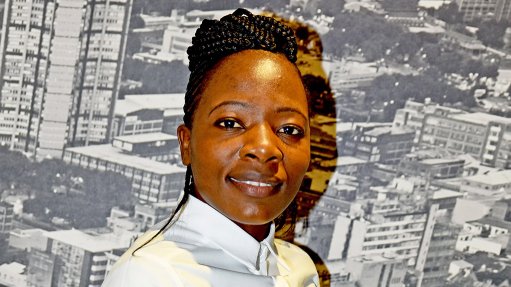
TSHILIDZI LUTSINGE Keabetswe Beverly Sehoole and Nokubonga Lady-Peace Nxumalo will receive funding from the AECOM Educational Trust this year
This year, integrated infrastructure delivery firm AECOM’s Educational Trust received more that 4 000 applications for bursaries for science, technology, engineering and maths (STEM) degrees from universities across South Africa – a significant increase from the 50 applications received last year.
Established in 2017, the trust was developed to provide financial assistance through a bursary to students pursuing careers in STEM-related professions.
“While a lot of girls do phenomenally well in maths, science and languages at school, there seems to be a fundamental disconnect between lower levels of schooling and the tertiary and professional levels,” says AECOM Africa marketing and communications director Rashree Maharaj.
She notes that this is owing to historic social imbalances that the trust seeks to proactively address.
“Reversing educational and gender imbalances is a top global priority and reflects the fifth United Nations Sustainable Development Goal to achieve gender equality and empower all women and girls,” Maharaj highlights.
AECOM aims to transform the world of work for women in the various fields of engineering and other related sectors to help enable a future of equal economic opportunities and outcomes in the workplace and technical trade space in Africa.
This year’s recipients are Keabetswe Beverly Sehoole, Nokubonga Lady-Peace Nxumalo and Tshilidzi Bridget Lutsinge. Lutsinge was one of the recipients of funding from the AECOM Educational Trust in 2017 and, with her having performed well in her master’s degree, AECOM will continue to fund her doctoral studies in chemical engineering this year.
The AECOM Educational Trust provides funding for three female students every year, and there is potential to increase the number of students in the future, AECOM Africa human resources director Senika Devsheel states.
Female students need to meet certain criteria to receive funding from the trust, which includes a good academic performance, with an average of 65% and higher; being a South African citizen; an employment equity candidate not older than 35; and an “all-rounder who excels in most things she does”, Devsheel explains.
The trust focuses on students who are academic achievers, but they also “need to be truly empowered women and go-getters”, Maharaj adds. The 2017 recipients of the trust demonstrated that, while the barriers to entry for professions are different for men and women, the latter have to have perseverance and tenacity, in addition to exceptional commitment and self-discipline, she says.
Moreover, the trust covers bursary fees, textbooks and residence fees – where required – and, in some instances, travel expenses and food. “AECOM understands the need to ensure that the beneficiaries are comfortable and supported during the term of their study,” Maharaj maintains.
The trust comprises three trustees: Maharaj, Devsheel and law firm Bowmans attorney Lusanda Raphulu.